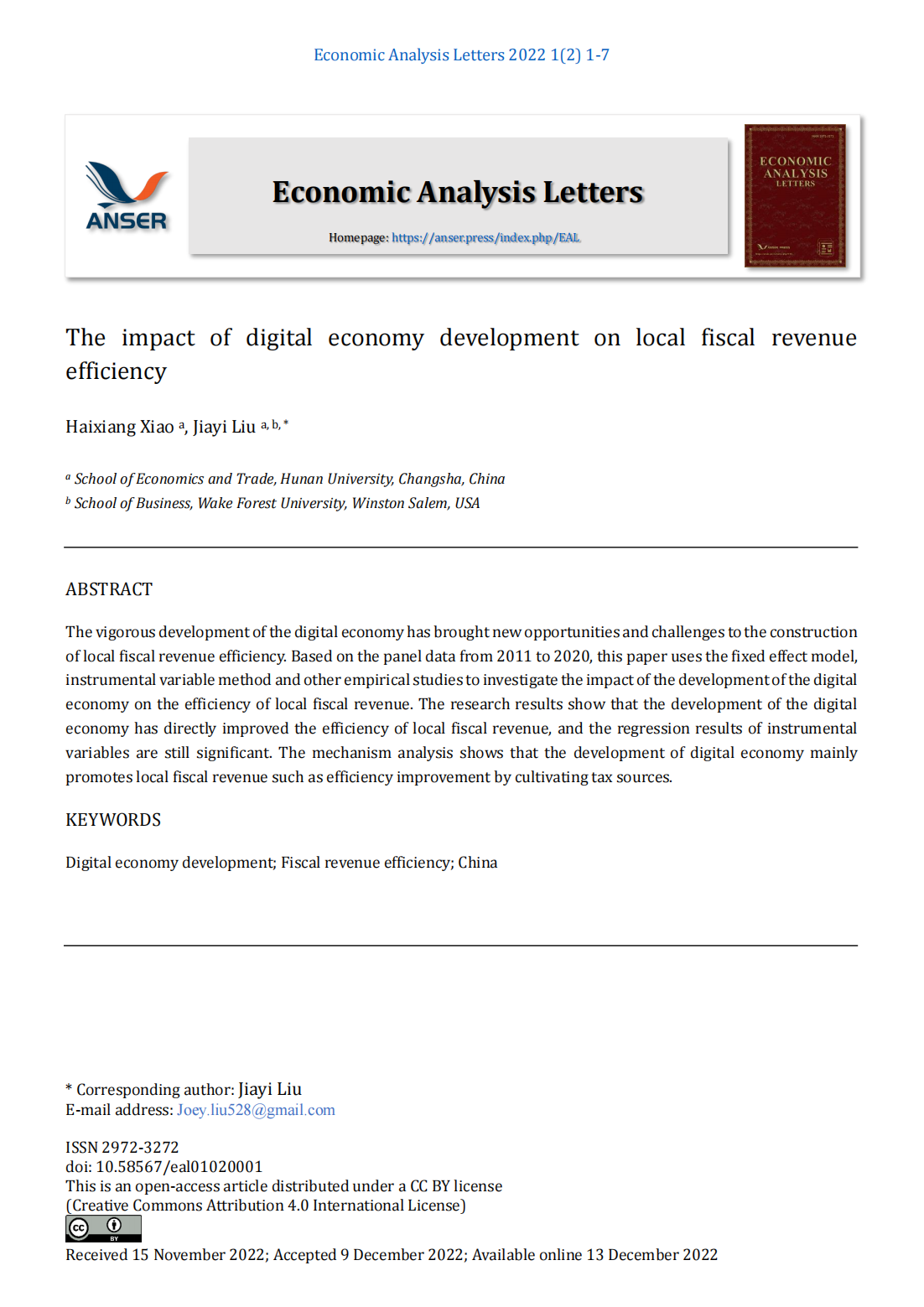The impact of digital economy development on local fiscal revenue efficiency
DOI:
https://doi.org/10.58567/eal01020001Keywords:
Digital economy development, Fiscal revenue efficiency, ChinaAbstract
The vigorous development of the digital economy has brought new opportunities and challenges to the construction of local fiscal revenue efficiency. Based on the panel data from 2011 to 2020, this paper uses the fixed effect model, instrumental variable method and other empirical studies to investigate the impact of the development of the digital economy on the efficiency of local fiscal revenue. The research results show that the development of the digital economy has directly improved the efficiency of local fiscal revenue, and the regression results of instrumental variables are still significant. The mechanism analysis shows that the development of digital economy mainly promotes local fiscal revenue such as efficiency improvement by cultivating tax sources.
References
Liu, J., Qin, Y., & Hong, Y. (2021). The influence mechanism and effect of fiscal efficiency on regional total factor productivity: from the perspective of comprehensive fiscal efficiency. Financial Research (03), 41-55. https://doi.org/10.19477/j.cnki.11-1077/f.2021.03.004.
Liu, J., Yang, Y., & Zhang, S. (2020). Research on the measurement and driving factors of China's digital economy. Shanghai Economic Research, (6), 81-96. https://doi.org/10.19626/j.cnki.cn31-1163/f.2020.06.008
Liu, W., & Chen, T. Has the digital economy promoted common prosperity? Based on the research perspective of regional coordinated development. Contemporary Economic Management. 1-19. https://kns.cnki.net/kcms/detail/13.1356.F.20221129.0915.002.html
Wang, Q., & Han, C. (2021). Economic development, financial competition and local financial efficiency: an analysis based on spatial Durbin model. Journal of Chongqing Technology and Business University (Social Science Edition) (04),46-54. https://doi.org/10.3969/j.issn.1672-0598.2021.04.006
Wu, H., Hao, Y., & Ren, S. (2020). How do environmental regulation and environmental decentralization affect green total factor energy efficiency: Evidence from China. Energy Economics, 91, 104880. https://doi.org/10.1016/j.eneco.2020.104880
Wu, H., Xue, Y., Hao, Y., & Ren, S. (2021). How does internet development affect energy-saving and emission reduction? Evidence from China. Energy Economics, 103, 105577. https://doi.org/10.1016/j.eneco.2021.105577
Yang, Y., & Guo, Ru. (2020). Transparency of local finance and improvement of financial efficiency. Local Finance Research (01),34-42.
Zheng, C., Deng, F., Zhuo, C., & Sun, W. (2022). Green Credit Policy, Institution Supply and Enterprise Green Innovation. Journal of Economic Analysis, 1(1), 28-51. https://doi.org/10.12410/jea.2811-0943.2022.01.002

Downloads
Published
How to Cite
Issue
Section
License
Copyright (c) 2022 Haixiang Xiao, Jiayi Liu

This work is licensed under a Creative Commons Attribution 4.0 International License.